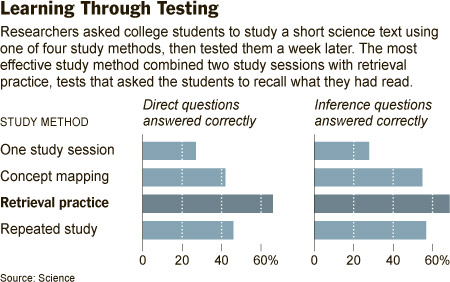Test Taking Enhances Learning
A new study casts new light on the importance of testing students to reinforce their grasp of information.
In my teaching days, I justified giving quizzes and exams on the basis that studying for them forced students to engage with the material, and thus enhance the learning experience. It turns out that the mere act of taking the test does the same thing.
Taking a test is not just a passive mechanism for assessing how much people know, according to new research. It actually helps people learn, and it works better than a number of other studying techniques.
The research, published online Thursday in the journal Science, found that students who read a passage, then took a test asking them to recall what they had read, retained about 50 percent more of the information a week later than students who used two other methods.
One of those methods — repeatedly studying the material — is familiar to legions of students who cram before exams. The other — having students draw detailed diagrams documenting what they are learning — is prized by many teachers because it forces students to make connections among facts.
[…]
“I think that learning is all about retrieving, all about reconstructing our knowledge,” said the lead author, Jeffrey Karpicke, an assistant professor of psychology at Purdue University. “I think that we’re tapping into something fundamental about how the mind works when we talk about retrieval.”
Several cognitive scientists and education experts said the results were striking. The students who took the recall tests may “recognize some gaps in their knowledge,” said Marcia Linn, an education professor at the University of California, Berkeley, “and they might revisit the ideas in the back of their mind or the front of their mind.” When they are later asked what they have learned, she went on, they can more easily “retrieve it and organize the knowledge that they have in a way that makes sense to them.”
[…]
The Purdue study supports findings of a recent spate of research showing learning benefits from testing, including benefits when students get questions wrong. But by comparing testing with other methods, the study goes further.
“It really bumps it up a level of importance by contrasting it with concept mapping, which many educators think of as sort of the gold standard,” said Daniel Willingham, a psychology professor at the University of Virginia. Although “it’s not totally obvious that this is shovel-ready — put it in the classroom and it’s good to go — for educators this ought to be a big deal.”
Howard Gardner, an education professor at Harvard who advocates constructivism — the idea that children should discover their own approach to learning, emphasizing reasoning over memorization — said in an e-mail that the results “throw down the gauntlet to those progressive educators, myself included.” “Educators who embrace seemingly more active approaches, like concept mapping,” he continued, “are challenged to devise outcome measures that can demonstrate the superiority of such constructivist approaches.”
The researchers emphasize that this doesn’t mean schools should constantly test at the expense of teaching. But, clearly, forcing students to organize and retrieve information is a valuable part of the learning process.
As a student, I used neither of the techniques above. I tended to go back and outline the class notes, organizing it in a way that made sense to me. Sometimes, I’d even integrate material from the readings. By the time I was done, extensive “studying” was unnecessary.
Hat tip: Glenn Reynolds








As a math instructor and not a trained educator I’m not up on all the education vocabulary. Is concept mapping the same as rewriting and outlining notes? It has been my experience that the axiom “if you want to learn something, teach it” works very well. The self-testing that goes along with preparing lesson plans and answering questions in real time certainly makes one learn the topic or risk looking like a fool. I prefer having my students teach each other as well as prepare them for testing individually. It seems to work for most except the ones who slack off, try and ride the others’ coattails and don’t care if they appear ignorant to their peers.